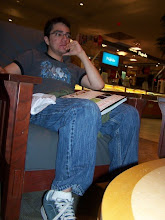 "'...the shooting will happen so fast and be over so quick that you'll wonder what all the planning and palaver was for, when in the end it always comes down to the same five minutes' worth of blood, pain, and stupidity.' He paused, then said: 'I always feel sick afterward.'"
"'...the shooting will happen so fast and be over so quick that you'll wonder what all the planning and palaver was for, when in the end it always comes down to the same five minutes' worth of blood, pain, and stupidity.' He paused, then said: 'I always feel sick afterward.'" I would say that quote sums up Stephen King's fifth Dark Tower book Wolves of the Calla, but that would be too harsh. I never feel sick after reading his books.
However, I do wonder what all the planning and palaver (important conversation) was for. In my Wizard and Glass review I mentioned that much of the book was flashbacks, and that King is attempting to tie all his works together. Wolves of the Calla is the same way, but I'm afraid that all the flaws of Wizard are more pronounced in Wolves.
Without giving away too much, King brings back Father Callahan, the priest who mysteriously vanishes at the end of 'Salem's Lot. A lot of Wolves is Callahan recounting what happened to him after he left 'Salem's Lot, all the while Roland twirling his fingers in a "hurry up and get to the point" fashion. I found myself twirling my fingers in much the same way.
See, Wolves is set against a town where most of the children are twins, and where monsters known as Wolves show up every so many years and take one child out of every pair of twins. The children are returned later, mentally and physically ruined and doomed to a short life. Roland and his ka-tet are meant to fight the Wolves in a Knights of the Roundtable meets Western sort of way, but this makes up very little of the actual story, and it shows. This part of the tale is filled with undeveloped characters and painfully obvious and simple plots.
But man oh man did I love finding out what happened to Callahan! The only annoying part (besides it having relatively little to do with the book) was Roland's constant finger twirling. Stephen King repeated it so many times. He repeated it so many times. He repeated it so many times.
Added to that, the number 19 or 99 or 1999 gets used to death as well.
A final criticism: tying everything together. King is starting to tie together not only his own works, but Harry Potter, Marvel Comics, and Star Wars. I've often said that King could write about a killer stapler that could talk and it would convince me, but there are moments in Wolves that are stretching it, even for King's great talents. I can cut him a little slack, though, because this idea fit into my own philosophy about writing. In On Writing, King compared writing to digging for fossils. A large part of me has always believed that what is written, by King, or myself, or other writers, is true is some strange sense. An alternate world? I don't know. But there are stories that are always there, waiting for us to find them.
Despite this book's flaw, I want to read the rest of the series. I want to know what happens to Roland and his ka-tet, and I want to see the connections that King will make. He's managed to write a book with a thin plot and a LOT of exposition that kept me interested the whole time.
I don't know how he does it.

No comments:
Post a Comment